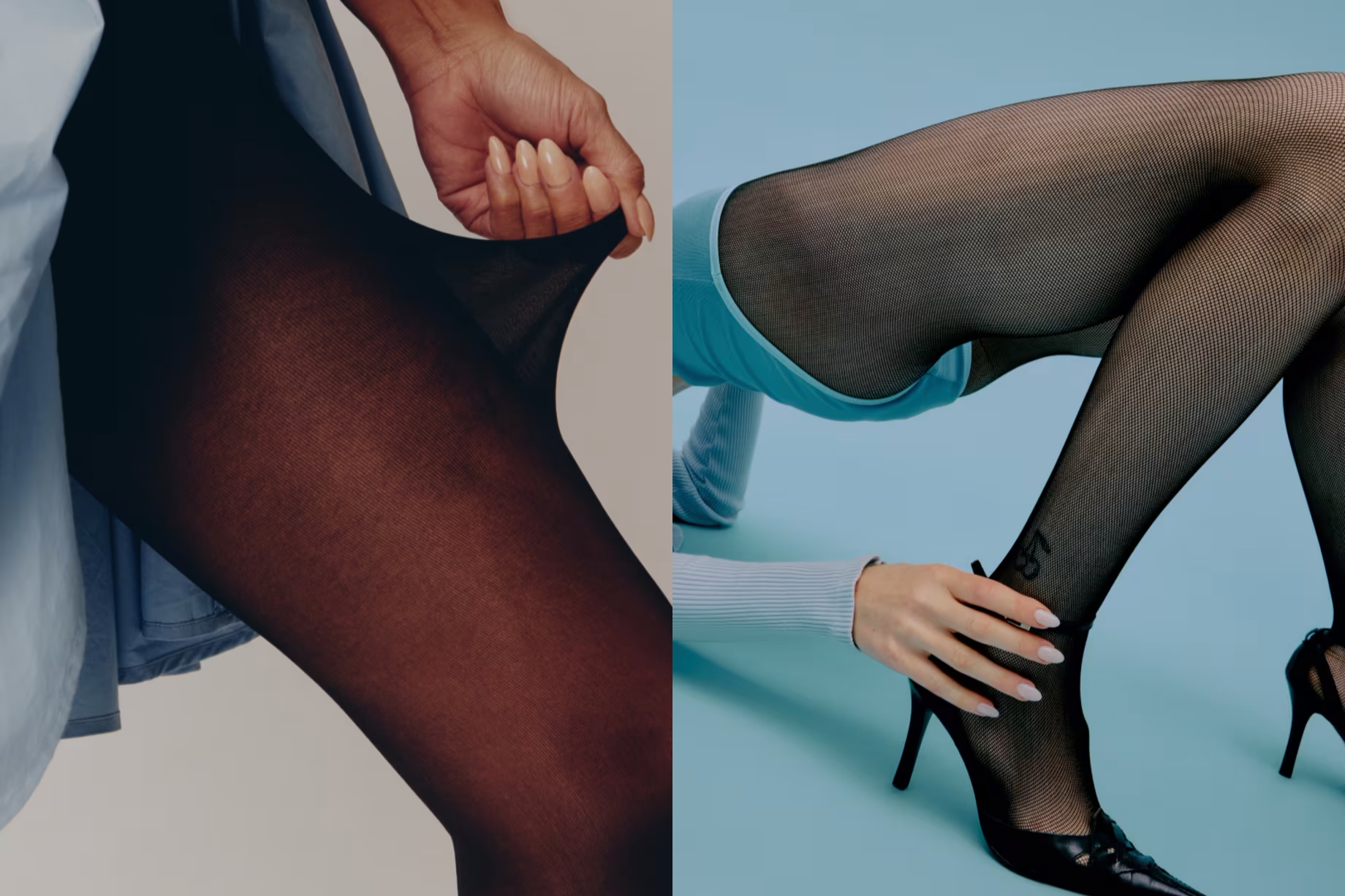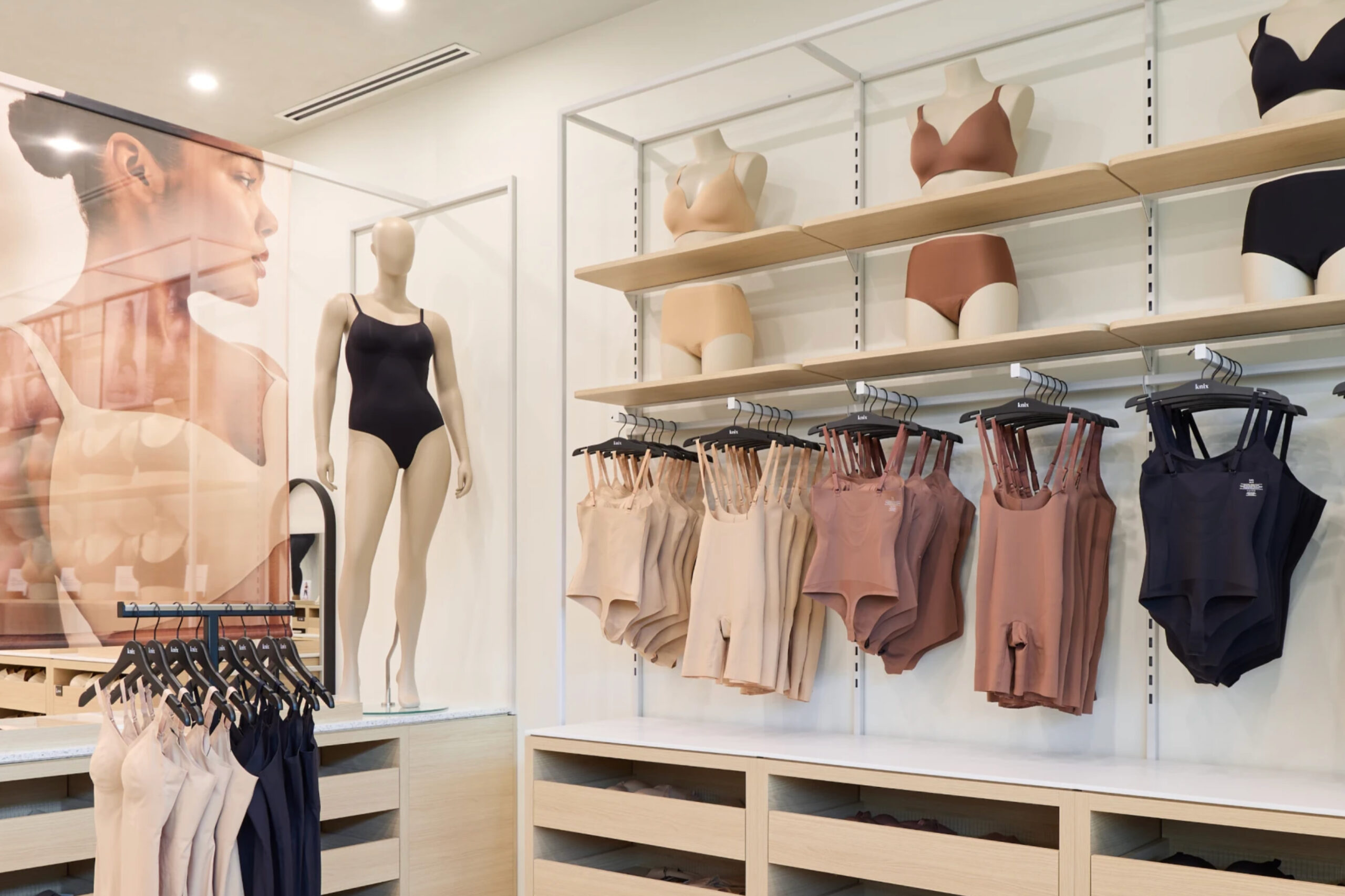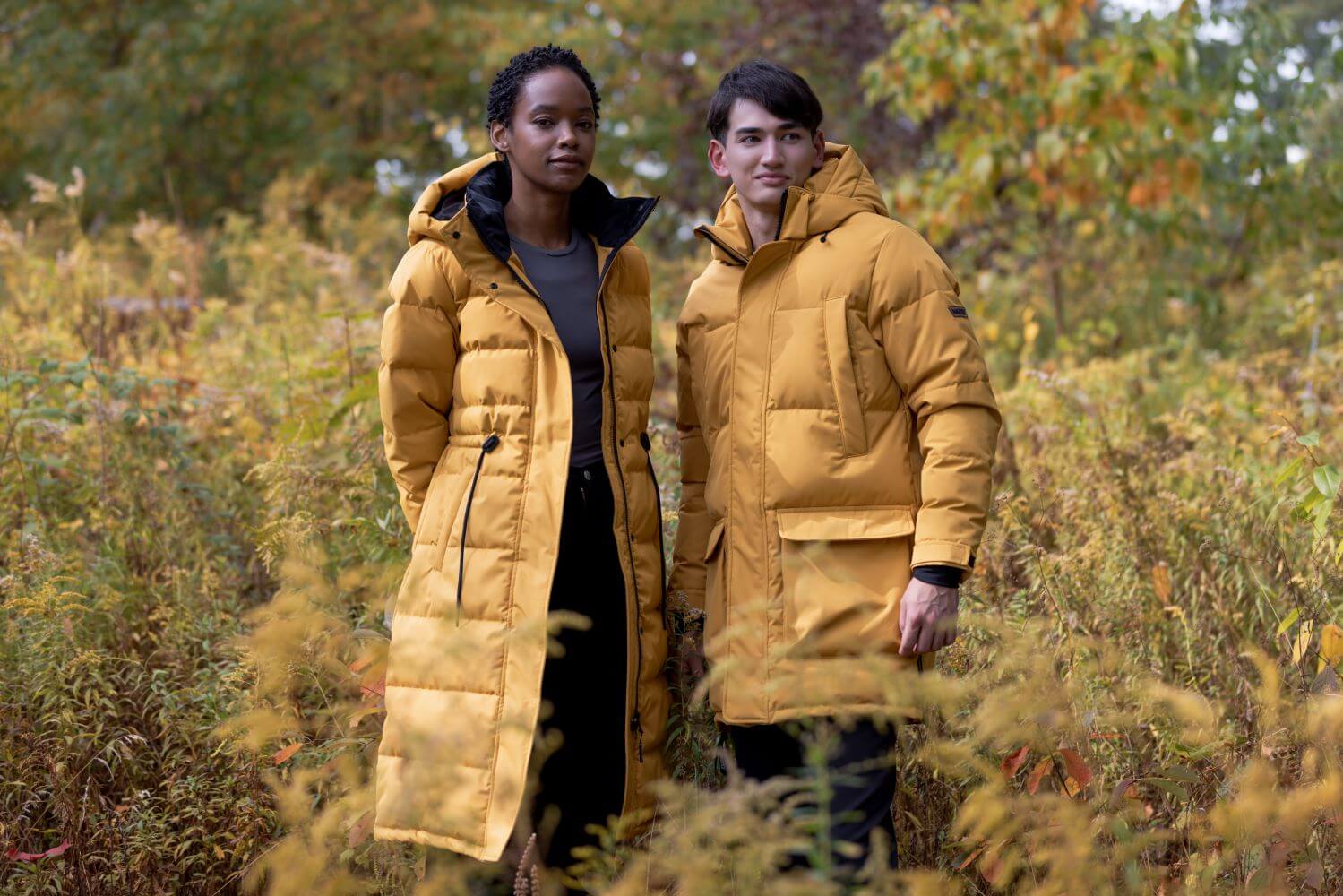“This new wave of responsible brands makes it easier to be dressed head-to-toe in quality gear at a reasonable price.”
Forget fast fashion. A new generation of North American designers is reimagining what we wear — and how we wear it — through bold ideas, innovative materials, and a determination to avoid sending anything to a landfill.
Today, dressing sustainably doesn’t mean sacrificing style or affordability. From jeans made to last a lifetime to jackets spun from recycled fishing nets or apple waste, innovation is stitched into every seam.
Whether through circular recycling programs, hyper-local production, or unexpected materials, each label in this round-up helps push fashion forward toward a future that’s lighter on the planet and heavier on intention.

WUXLY garments use plant-based fabrics like apple-skin leather. Courtesy of WUXLY
North Stars: Carbon Footprint, Waste Management, Certifications
Made in small batches from plant-based and recycled materials, WUXLY’s collection of outerwear essentials like parkas, coats, and fleeces appeals to eco-minded outdoorists with an eye toward simple but refined style. Fashioned from materials like recycled nylon and polyester, plant-based fabrics like Sorona® corn-based fiber, and other bio-based textiles like apple skin leather, this B Corp-certified apparel company renders its clothing in earthy, organic colorways, opting for sleek, monochromatic looks that can pull double-duty on outdoor adventures or walking around town.
Animal-free, ethically made, and earth-first, WUXLY also encourages its shoppers to recycle unwanted parkas for store credit with its Trade Up program, which distributes these gently-used, pre-owned items to those in need. Furthermore, the company partners with Ocean Co. to remove plastic waste from circulation before it reaches oceans, and, along with a growing number of other Canadian brands, is working to achieve net-zero emissions by 2050.
Statement of Sustainability
Price Range | $55-$1,095
Best For | Casual clothing and outerwear

Sheertex's long-lasting tights have helped prevent millions of pairs going to landfills. Courtesy of Sheertex
North Stars: Carbon Footprint, Waste Management, Certifications
Sheertex has made a name for itself with its rip-resistant, ultra-strong tights, created from hyper-durable, trademarked materials. But these long-lasting tights aren’t just better for your wallet. They’re also better for the environment, keeping an estimated 33 million pairs of disposable tights out of landfills.
Along with creating dependable and enduring tights and hosiery that won’t end up in landfills after a couple uses, this B Corp-certified company has also found myriad ways across its production process to reduce extra waste. Leftover fabric finds new purpose as socks, headbands, masks, and scrunchies as part of the Zero Waste collection, and products get shipped out in recyclable, plant-based and biodegradable packaging materials.
Statement of Sustainability
Price Range | $15-$99
Best For | Women’s hosiery

BEDI upcycles materials like fishing nets and seatbelts for its outerwear garments. Courtesy of BEDI
North Stars: Waste Management, Carbon Footprint, Water Management
It started with seatbelts. When BEDI founder Inder Bedi learned how much seatbelt material ends up in landfills, he decided to find some new uses for them. Now, seatbelts have gone from saving lives to helping save the planet as a core part of BEDI’s mission to recycle and reuse all different types of waste, giving these discarded materials new life as handmade, small-batch bags and clothing items like jackets and vests.
Along with seatbelts, which are incorporated into the design of BEDI’s bags and packs, BEDI also uses a host of other recycled materials like a nylon blend derived from fishing nets, carpets, and pre-consumer waste. Many materials come from scrap yards and other sources in the Montreal area close to the company’s headquarters, and even textiles, fabrics, and materials not locally sourced come from sustainable suppliers like vegan cactus leather from Mexico and ethically grown and raised cotton and wool. All this is used to create minimalist, sophisticated pieces, robustly built to last with a lifetime guarantee.
A certified B Corp with multiple other environmental certifications, BEDI is also dedicated to social responsibility. Adhering to International Labour Organisation (ILO) Standards to provide a safe and ethical workplace for its “Makers” who craft each item by hand, it holds all of its suppliers to the same accountability standard. With its Second Life program, the brand also minimizes waste by inviting customers to trade in their lifetime-guarantee BEDI pieces for discounts on new pieces, with a second-hand market for pre-used items to find new homes. Through a collaboration with 4Ocean, orders over $100 remove a pound of plastic from oceans and coastlines as well.
Statement of Sustainability | Social responsibility statement
Price Range | $37-$897
Best For | Utilitarian pieces suited for cold climate

Everlane's chic apparel aligns with UN sustainability goals. Courtesy of Everlane
North Stars: Energy Efficiency, Community Support, Carbon Footprint
From shoes to shirts to dresses, Everlane has acquired a devoted fanbase and cult following for its chic basics and highly rewearable pieces. And the company does it all with a keen, transparent eye toward sustainability and ethical production.
Everlane follows three pillars of sustainability: Keep Earth Clean, Keep Earth Cool, and Do Right by People. While sounding lofty, the initiative aligns with the UN’s Sustainable Development Goals, which provides a blueprint for addressing global challenges. Baked-in best practices include reducing the consumption of natural resources, minimizing waste and pollution, promoting gender equality, and offering living wages to factory workers. The consumer can find a wealth of information about each factory online as a part of the company’s Transparency Pledge. Everlane is also en route to Net-Zero by 2050 and has a plethora of certifications and awards including GOTS, OCS, RAS, and GRS.
Statement of Sustainability | Impact report
Price Range | $22-$394
Best For | Complete wardrobe, including shoes

Shop sustainably-made undergarments from Knix. Courtesy of Knix.
North Stars: Carbon Footprint, Community Support, Diversity and Inclusion
In the United States alone, roughly 20 billion single-use, disposable period products get thrown away each year. With its leak-proof, stylish, and comfortable period underwear, Knix offers a more sustainable, reusable alternative, helping keep thousands of pads out of landfills annually.
Branching out from period underwear to undergarments, swimwear, loungewear, and activewear, Knix’s sustainability commitment goes further than preventing waste as well. Its main transparency point is its supply chain. Carefully managed to avoid modern slavery, it adheres to conscientious production following the Ethical Supply Chain Guidelines. Knix also supports different menstrual equity organizations by donating products or proceeds. Past Knix Fund grants have helped with essential work like providing products to communities and groups in need, translating menstrual health information into a range of different languages, including Indigenous languages, and offering programming and educational resources.
Statement of Sustainability
Price Range | $18-$227
Best For | Women’s undergarments and leak proof underwear

Kateryna is a Toronto-based freelance writer, photographer, and content creator. Her bylines appear in domestic and intentional print and digital publications while the more personal musings and travel itineraries live on pathstotravel.com. Kateryna aims to tell travel stories through visually engaging content focusing on explorative, mid-point to luxury travel, accommodations, food and beverage, and wellness. She is the chapter lead of Toronto Travel Massive, an International travel industry community-driven organization, and founder of a North American music magazine, QuipMag.com. Follow Kateryna on IG @katerryna.



